Happy Monday! We missed you guys! Who’s ready to catch up on five days’ worth of news?
Quick Hits: Today’s Top Stories
- A coalition of Syrian rebel groups on Saturday seized most of the country’s northwest city of Aleppo, surprising both international observers and the regime of Syrian dictator Bashar al-Assad. Calling itself the Military Operations Command, the rebel grouping consists of Islamists and insurgent groups backed by Turkey, and it launched its offensive on Wednesday from the opposition stronghold of Idlib in northwest Syria. Along with Syrian fighter planes, Russian jets began airstrikes against the city on Saturday for the first time since 2016, when rebel forces were forced out of the key hub.
- President-elect Donald Trump announced on Truth Social on Saturday that he plans to nominate Kash Patel, a former federal prosecutor and national security staffer, to serve as director of the FBI—a position currently held by Christopher Wray. Patel has been one of Trump’s most loyal allies and a harsh critic of the bureau, arguing that it needs to be purged to root out political bias and end what he believes to be the politically motivated prosecutions of Trump and his allies. Trump first nominated Wray to what is typically a 10-year term atop the agency in 2017 after he fired former FBI Director James Comey, but quickly soured on his pick and reportedly came close to firing him near the end of his first term.
- President Joe Biden on Sunday evening issued a presidential pardon for his son, Hunter Biden, going back on repeated promises in recent months that he would not help his son avoid federal prosecution and conviction. Hunter Biden was facing sentencing later this month in two separate federal cases involving gun and tax evasion charges. “I believe in the justice system, but as I have wrestled with this, I also believe raw politics has infected this process and it led to a miscarriage of justice—and once I made this decision this weekend, there was no sense in delaying it further,” President Biden said in a statement. “I hope Americans will understand why a father and a President would come to this decision.” Hunter was pardoned for any crimes he “committed or may have committed or taken part in during the period from January 1, 2014 through December 1, 2024.” In a separate statement released Sunday night, Hunter wrote that he had “taken responsibility for [his] mistakes during the darkest days of [his] addiction,” and that he will “never take the clemency [he has] been given today for granted.”
- Egypt hosted Hamas officials on Sunday for negotiations with Egyptian officials toward a hostage-ceasefire deal in Gaza, as Israeli Prime Minister Benjamin Netanyahu convened a security meeting to discuss a potential agreement. GOP Sen. Lindsey Graham of South Carolina traveled to Israel last week and said Friday that President-elect Trump wants a deal before he takes office. “I want people in Israel and in the region to know that Trump is focused on the hostages issue,” Graham said. “He wants the killing to stop and the fighting to end.” Hamas on Saturday released a propaganda video that seemed to include proof of life of Edan Alexander, an American hostage the group has held since October 7, 2023. There are some 100 hostages still being held in Gaza, many of whom are believed to be dead and seven of whom are American.
- The United Nations Relief and Works Agency for Palestine Refugees (UNRWA) said Sunday that it would halt aid deliveries to Gaza through the Kerem Shalom crossing connecting Israel to Gaza. U.N. officials said the “humanitarian operation has become unnecessarily impossible,” citing recent looting by armed groups as well as “hurdles from Israeli authorities,” “political decisions to restrict the amounts of aid,” and the “ongoing siege.” Israeli officials pushed back on the UNRWA’s characterization of the situation, claiming UNRWA was only responsible for 7 percent of all aid that was delivered into the Gaza Strip in November.
- A ceasefire between Israel and Lebanon mostly held over the weekend, with the Israel Defense Forces (IDF) claiming it struck several sites actively being used by Hezbollah fighters while refraining from large-scale operations. Israel and Lebanon signed a 60-day ceasefire that went into effect on Wednesday, stipulating that Israeli forces withdraw from Lebanon and Hezbollah forces draw back to 25 miles from the Israel-Lebanon border during that time frame. A U.N.-forum, chaired by France and the United States, will oversee the terms of the deal.
- Russian President Vladimir Putin authorized record levels of new military spending on Sunday as Russia approved its budget for 2025. Almost 33 percent of the national budget will be marked for defense in the coming year, up from about 28 percent in 2024. Meanwhile, Ukrainian President Volodymyr Zelensky argued Friday that the “hot stage” of the war between Russia and Ukraine could be ended by offering NATO membership to Ukraine.
- Three Americans being held in China on drug and espionage charges were exchanged on Thursday for three Chinese prisoners held by the U.S. government, leading the State Department to remove a travel advisory warning of the risk of wrongful detention in China. Among those released were an American man who’d been sentenced to death for a drug trafficking charge, despite the lack of evidence, and two Americans who’d been accused of espionage. Two of the Chinese nationals released from U.S. custody had reportedly engaged in espionage; the third was a student “connected to influential members of the Communist Party in China” who was convicted in 2021 for possessing child pornography.
- China’s foreign ministry said that it had “lodged serious protest” with the United States Sunday over Taiwanese President Lai Ching-te’s visit to Hawaii. Hawaii is the first stop on Lai’s trip, after which he will visit the Marshall Islands, Tuvalu, Palau, and Guam, in a tour of nations that recognize Taiwan’s independence. “Peace is priceless, and war has no winners,” Lai said at a dinner in Hawaii on Saturday attended by a few members of Congress and former U.S. officials. “We have to fight, fight together to prevent war.”
- Tens of thousands of people in the Georgian capital of Tbilisi protested over the weekend against the government’s recent withdrawal from European Union membership negotiations. The anti-European Georgian Dream party increased its governing majority in elections earlier this month, which the European Parliament officially categorized as “neither free nor fair.” The State Department announced Saturday that the U.S. would be suspending its strategic partnership with Georgia, due to the government’s increasingly authoritarian methods and use of “excessive force” against protesters.
- Kosovan police arrested eight people on Saturday on suspicion of involvement in a massive blast that damaged a canal one day earlier, temporarily halting water and power supplies to Kosovo’s cities. Kosovo police chief Gazmend Hoxha said that police had seized a large arsenal of weapons and explosives hidden in more than ten locations. Police have alleged that the weapons and explosion were linked to Civilna Zastita, a pro-Serb group, and that it was supported by the Serbian government. “Belgrade and Serbia have nothing to do with those events,” Serbian President Aleksandar Vučić said on Sunday, baselessly accusing Kosovo of orchestrating the attacks itself.
- The Trump transition team said last week that many of President-elect Trump’s Cabinet picks had been targeted with a spate of bomb threats and swatting attacks, the same week that most of Connecticut’s congressional delegation received bomb threats. None of the threats proved credible, according to statements by lawmakers, law enforcement, and members of the Trump transition team. House Minority Leader Hakeem Jeffries called for “maximum” security protection for members of Congress on Friday, and House Speaker Mike Johnson condemned the bomb threats as “dangerous and insane.”
- Canadian Prime Minister Justin Trudeau met with President-elect Trump at Mar-a-Lago on Friday, just days after Trump’s threat of a 25 percent tariff on Canadian imports. The two reportedly discussed trade, border security, pipelines, and defense spending, in a conversation that Trump characterized as “very productive.”
- The United Kingdom’s House of Commons on Friday voted 330 to 275 on Friday to advance a bill allowing terminally ill adults in England and Wales to commit suicide. If the bill passes a further vote, it will allow terminally ill people who are over the age of 18 to be provided with lethal drugs that they can take to end their lives. Conservative MP Danny Kruger, who led the opposition to the law, argued that ministers were “the people who protect the most vulnerable in society from harm and yet we stand on the brink of abandoning that role,” in favor of a “state suicide service.”
- Right-wing political commentator Dinesh D’Souza on Sunday published an apology to Mark Andrews, the Georgia man he wrongly identified as being a “ballot mule” in 2000 Mules, D’Souza’s debunked 2022 film alleging mass voter fraud in the 2020 presidential election. “We recently learned that surveillance videos used in the film may not have actually been correlated with the geolocation data. I know that the film and my book create the impression that these individuals were mules that had been identified as suspected ballot harvesters based on their geotracked cell phone data,” D’Souza wrote. “I apologize to Mr. Andrews. I make this apology not under the terms of a settlement agreement or other duress, but because it is the right thing to do, given what we have now learned.” Andrews had sued D’Souza for defamation in 2022, alleging the film had falsely accused him of illegally transferring ballots. Salem Media, which published the book and film, also apologized to Andrews earlier this year and halted distribution of the film.
Syrian Civil War Heats Up
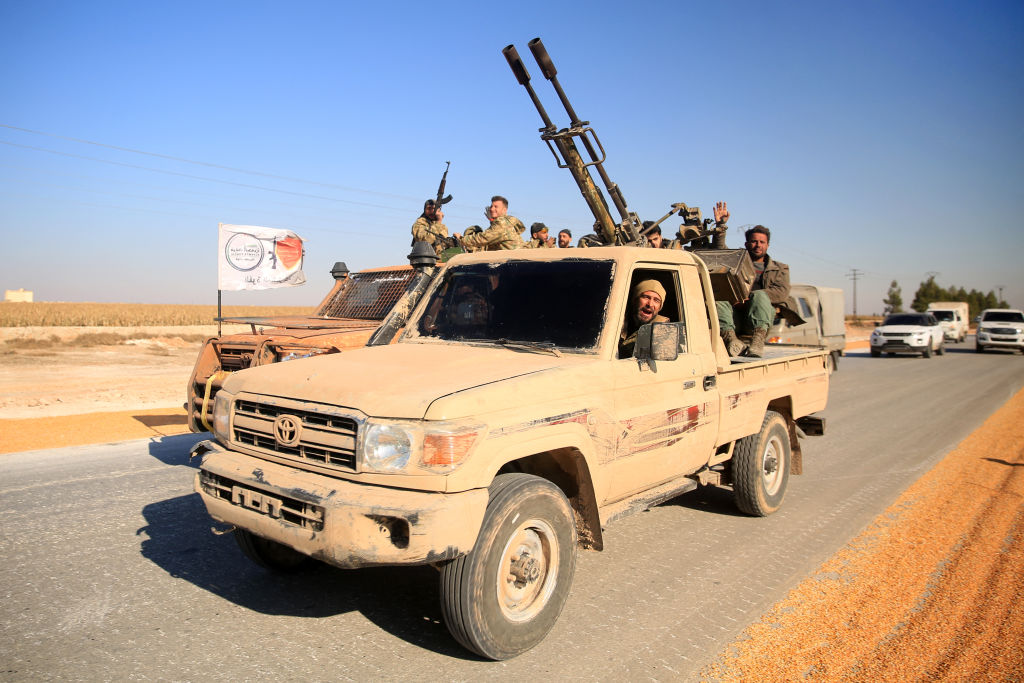
As Syrian rebels charged into Aleppo over the weekend, setting foot in the city for the first time since they were forced out in 2016, some residents greeted them in the street with hugs.
The Syrian opposition launched a surprise offensive on Wednesday that quickly saw its forces take the major city over the weekend, a sign that one of the world’s frozen—yet continuously lethal—conflicts seems to be heating up once again.
The renewed fighting 13 years after the beginning of the war appears to be an effort to exploit new weakness and distraction among the Syrian government’s key partners—Russia, Hezbollah, and Iran—but it’s unclear how long the spasm of violence will last and what kind of enduring destabilizing effect, if any, it might have on the regime of Syrian dictator Bashar Al-Assad.
Videos and images over the course of the last few days purported to show rebel forces in Aleppo burning Syrian flags and vandalizing posters of Assad, with whom they’ve been locked in a bloody conflict since 2011 after Assad brutally repressed peaceful pro-democracy demonstrators calling for his ouster.
Since the beginning of the fighting—which saw the Assad regime repeatedly use chemical weapons on its own people and spawned a desperate refugee crisis that reshaped Europe—the rebel coalition has been messy, and included some deeply unsavory characters. The tip of the current rebel spear is the Islamist Hay’at Tahrir al-Sham (HTS), formerly known as the al-Nusra Front. HTS was once associated with al-Qaeda, but has taken some pains in recent years to publicly break with the group. Nevertheless, the U.S. has designated it as a terrorist organization.
Syrian rebels, apparently led by the HTS, on Wednesday launched a surprise offensive from Idlib province, moving over the course of several days to take swaths of Aleppo on Saturday. As they advanced, they captured villages and claimed weapons and vehicles previously used by government forces.
Though the rebels have not just waltzed in—there were reports of some fighting between opposition and government forces as the HTS and its allies captured the Aleppo airport and military academy on Sunday—their march to Aleppo was swift. The United Kingdom-based Syrian Observatory of Human Rights, which tracks the conflict in the country, reported that the rebels were met with little resistance on the ground by the Syrian military. Government officials and the heads of the police and security withdrew from Aleppo as the rebels swept in. Some 400 people—both civilians and combatants—have already been killed in this recent spate of violence.
On Sunday, the fighting seemed to extend to the south of Idlib as well, toward government-held Hama in western Syria. There, some regime forces seemed to retreat before they’d met the enemy, though reporting from the Syrian Observatory also indicates they are setting up checkpoints outside the city, cordoning it off. But opposition forces have still reportedly taken more than half a dozen Syrian military bases, with all of their accompanying loot.
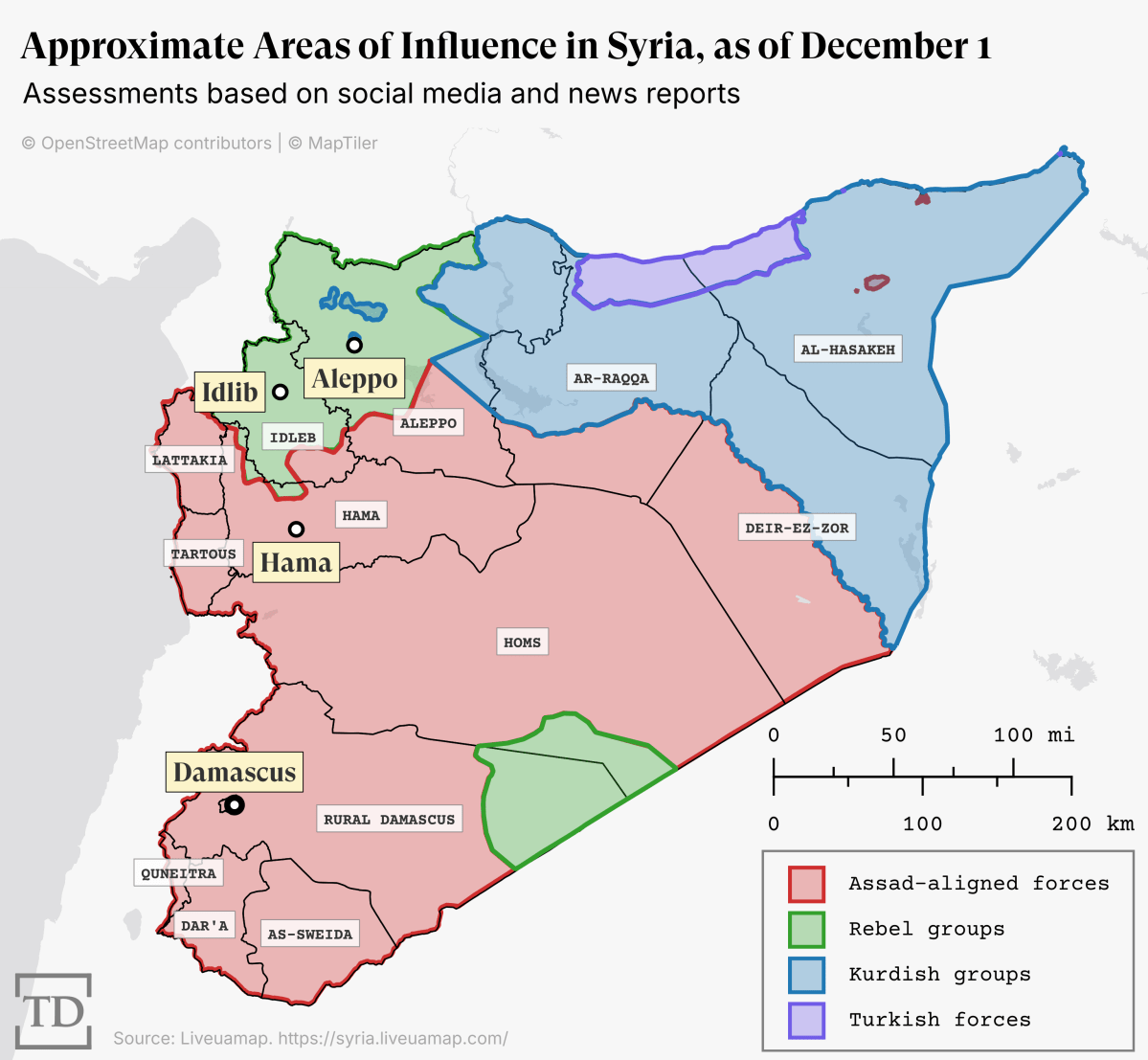
The speed of the rebel advance is both a sign of the rebels’ increased professionalism after four years of training and organizing and of the regime forces’ dysfunction and lack of preparedness. It’s primarily a result of “a profoundly fragile [Syrian] regime & fragmented ‘military,’” argued Charles Lister, the director of the Syria program at the Middle East Institute.
In recent years, the contours of the conflict had basically stabilized. Rebel forces controlled territory in the northwest around the city of Idlib, while Assad’s regime held around 70 percent of the country, including the rest of the major cities. The United States and its allies had intervened in Syria in the latter part of the last decade to put down the Islamic State of Iraq and Syria (ISIS), successfully ending its control of territory in the country.
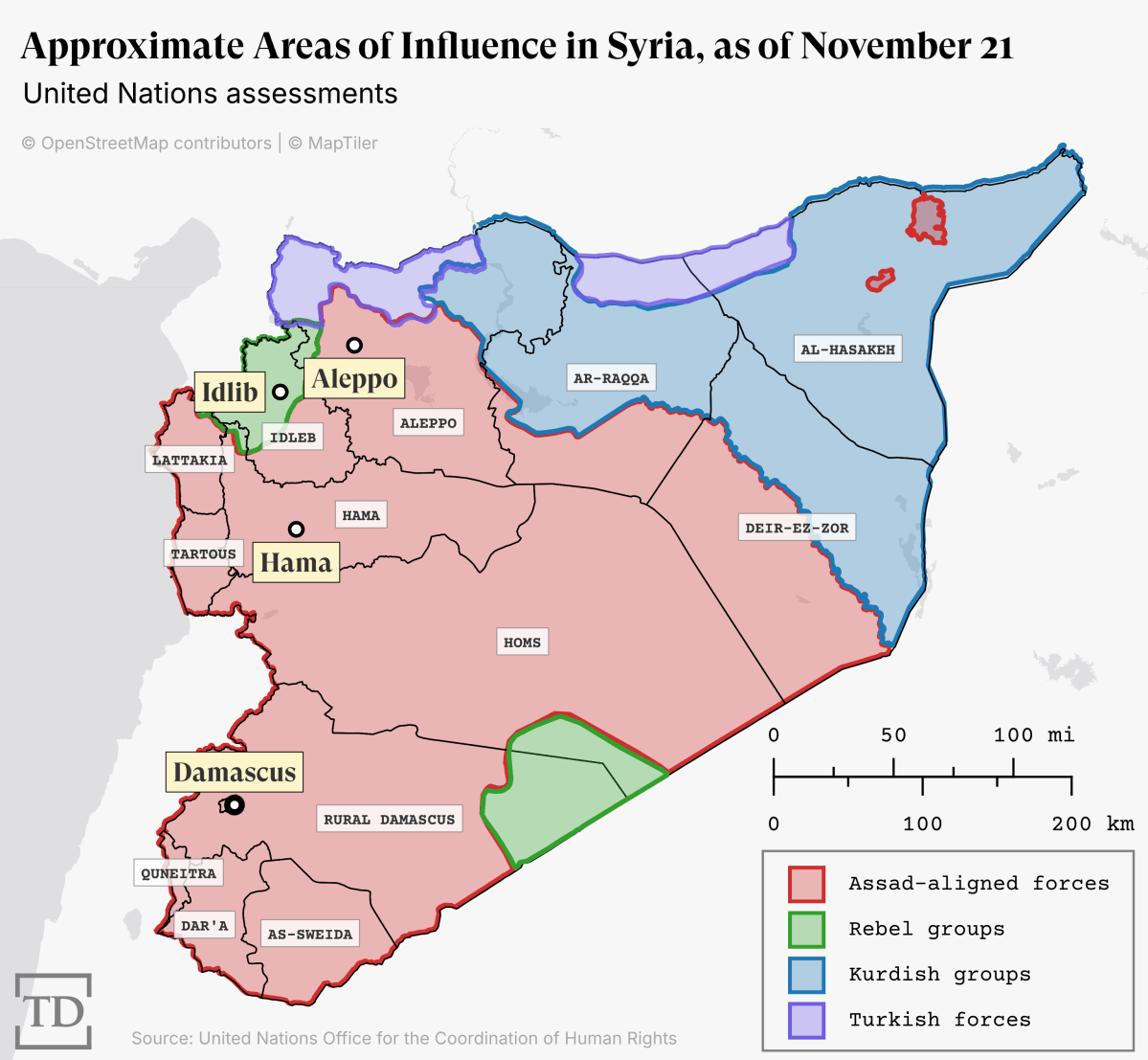
The civil war—in addition to turning the country into a hotbed for terrorism—also devolved into a proxy war of sorts. The Assad regime was propped up at every turn by Russia—whose forces and mercenaries were on the ground as recently as last year—and Iran. Iran’s proxies, and Hezbollah in particular, have also intervened on Assad’s behalf. As Charlotte reported in September, Syrians in rebel-held Idlib rejoiced in the streets when Hezbollah leader Hassan Nasrallah was assassinated by Israel.
Turkey supports rebel forces in Syria and Turkish forces directly operated in parts of northwestern Syria from 2016. In 2020, Turkey and Russia signed a ceasefire agreement successfully quelling a conflict in northwest Syria that threatened to have Russian forces engaging directly with a NATO ally. The civil war had been largely stalemated.
Until last week.
The rebels may be jumping at a moment of relative weakness for Russia, Iran, and its proxies who had previously propped up Assad. Russia, starved for manpower and ammunition, has removed some forces and materiel from Syria to prosecute its war in Ukraine. Bludgeoned by Israeli air strikes last month, Iran’s capabilities have been diminished as its proxies are taking a beating in Gaza and Lebanon. The Israel Defense Forces (IDF) pummeled Hezbollah—once involved in the fighting in northwestern Syria and formerly the crown jewel of Iran’s proxy forces—with airstrikes and a ground invasion, ultimately forcing Hezbollah to acquiesce to a ceasefire last week.
“We were not surprised that these rebels would try to take advantage of a new situation in which the Syrian government’s main backers—Iran, Russia, and Hezbollah—were all distracted and weakened by conflicts and events elsewhere,” National Security Adviser Jake Sullivan told CNN on Sunday.
In recent months, Syria has also been the venue for strikes in the proxy war between Israel and Iran. The IDF frequently hit Iranian targets in the country over the last year, including an April strike in Damascus that killed a Syrian commander and precipitated Iran’s first-ever direct attack on Israel later that same month.
Likewise, U.S. forces stationed in northeast Syria have been hit by rocket fire from Iranian proxies. “At the moment,” Sullivan said, “we believe that our forces, who are stationed in Syria to fight ISIS, are not at proximate risk because they are in a different part of the country from where this particular offensive is taking place.”
Though Syrian government forces haven’t put up much of a fight this week, Russia hasn’t been entirely absent—despite the Kremlin’s preoccupation with its own war. On Saturday, Russian fighter jets bombed Aleppo for the first time since 2016. There have also been Russian strikes, along with the Syrian government’s planes, across Idlib province and near Hama.
Assad, for his part, has been out of the spotlight. Though the Syrian government denies it, he reportedly spent part of the last week in Moscow, asking Russian officials to come to his aid. Over the weekend, the Iranian foreign minister visited Damascus to pledge Iranian support for the dictator—though it’s not clear what that will look like materially. The offensive has ultimately demonstrated just how brittle and reliant the regime is, though the durability of the rebels’ success is unclear.
“The group at the vanguard of this rebel advance, HTS, is actually a terrorist organization designated by the United States, so we have real concerns about the designs and objectives of this organization,” Sullivan said. “At the same time, of course, we don’t cry over the fact that the Assad government, backed by Russia, Iran and Hezbollah, are facing certain kinds of pressures.”
Worth Your Time
- Why did Democrats fail to convince voters that they took inflation, the economy, and immigration seriously this election cycle? “One possibility is that Democratic advocacy groups are prominently pushing ideas that even their own most progressive voters are lukewarm about,” Stephen Hawkins and Daniel Yudkin wrote for The Atlantic. “Another is that Donald Trump’s campaign successfully linked Kamala Harris’s campaign with controversial transgender-policy stances. In a widely seen attack ad, a 2019 interview clip of Harris explaining her support for publicly funded sex-change surgeries for prisoners, including undocumented immigrants, was punctuated by a voiceover intoning that ‘Kamala is for they/them; President Trump is for you.’ In tests run by Harris’s main super PAC, 2.7 percent of voters shifted toward Trump after being shown the ad—a massive result. The constant reinforcement of the link between Harris and this policy, coupled with Harris’s apparent inability or unwillingness to publicly distance herself from it, likely reinforced Americans’ association of trans issues with Democrats.”
- The New Yorker investigated a college-football phenomenon: annual games between mighty powerhouses like Georgia and cupcakes like the University of Massachusetts, Amherst. “Scheduling the rest of the games is a kind of art,” Louisa Thomas wrote. “Some games are what’s known as home-and-home series—teams take turns playing home and away, most often without money exchanging hands. Athletic directors target a certain strength of schedule. Then finances come into play. Departments need to fund their expenses, which they do get from selling games to richer teams. They consider logistical factors, like the distance between a stadium and an airport. Having competitive games on the schedule is a factor, too. Cupcake games can be risky for schools, and not only for the team that might find itself losing 63–0. ‘If you’ll allow me to use the industry-specific term here, they’re all dogshit,’ Brown said, of the quality of the games, ‘and people won’t want to go.’”
Presented Without Comment
New York Times: Pete Hegseth’s Mother Accused Her Son of Mistreating Women for Years
The mother of Pete Hegseth, President-elect Donald J. Trump’s pick for secretary of defense, wrote him an email in 2018 saying he had routinely mistreated women for years and displayed a lack of character.
“On behalf of all the women (and I know it’s many) you have abused in some way, I say … get some help and take an honest look at yourself,” Penelope Hegseth wrote, stating that she still loved him. …
Mrs. Hegseth, in a phone interview with The New York Times on Friday, said that she had sent her son an immediate follow-up email at the time apologizing for what she had written. She said she had fired off the original email “in anger, with emotion” at a time when he and his wife were going through a very difficult divorce.
Also Presented Without Comment
Politico: Biden’s Frustrating Photo Finish
As grim reality has set in following DONALD TRUMP’s election victory, those staffers toiling away in the West Wing and EEOB have had something else sapping their morale — and blowing up their group chats: a growing concern that they might not get their departure photos with the president, a meaningful memento for those who have served in this and past administrations. …
Biden did not take any departure photos for several months, perplexing staffers who’ve always appreciated his personal touch. “They just took them off his schedule months ago, and no one knows why,” the former official said. “Of course the culture is bad over there if they’re not doing the little things.”
In the Zeitgeist
It was rivalry weekend in college football, and things got … heated in several stadiums across the country. For the record, guys, you can’t actually plant a flag on AstroTurf, anyway.
There were also plenty of intra-Dispatch tensions over Ohio State’s loss to Michigan on Saturday—but boy was it fun to watch for everyone except managing editor Rachael Larimore.
Toeing the Company Line
- What’s the best Beatles album? Have any politicians impressed Mike Warren? Why is Norm Macdonald the greatest comedian of all time? Our own senior editor answered readers’ questions about all that and more in the latest installment of The Monthly Mailbag.
- In the newsletters: Jonah Goldberg meditated on Thanksgiving and, in Dispatch Faith, Michael Reneau reflected on rootedness and his decision to get a tattoo.
- On the podcasts: Jonah ruminated on his recent conversation with Yuval Levin.
- On the site over the long weekend: Kevin Williamson explored the real miracle of the water and the wine at the Cana wedding, wondered how much influence Trump’s advisers will actually have, and conceded he may have been wrong about Mike Judge’s Idiocracy. Alina Clough pondered what conservationism with humans at the heart might look like, Wilson Shirley praised Gladiator II while arguing it lacks the cultural heft of the original, and Father Robert Sirico wrote in defense of subsidiarity at a time when both parties are drifting toward centralization.
- On the site today: Charlotte looks at whether the Israel-Hezbollah ceasefire was a success for either side and Flagg Taylor profiles Vladimir Kara-Murza, a freed Russian political prisoner.
Let Us Know
What were some of the highlights from your Thanksgiving holiday?



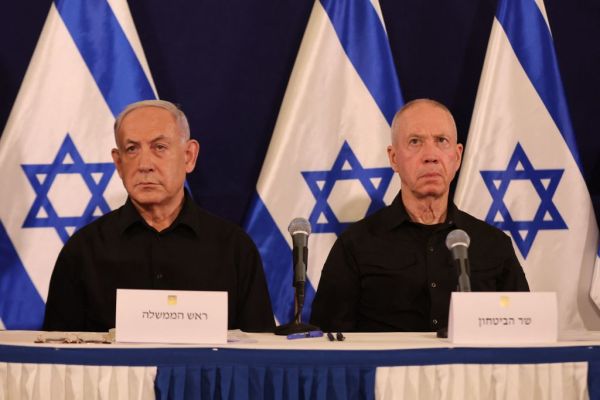

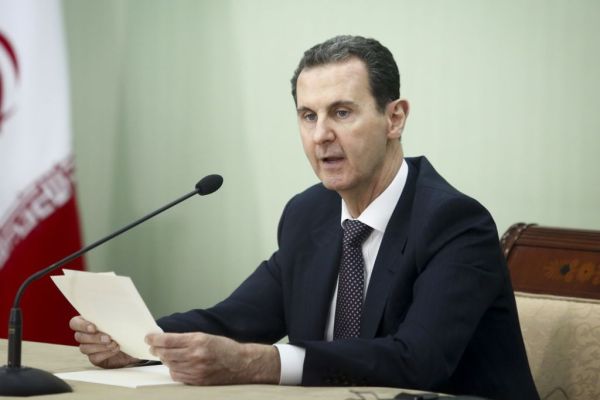

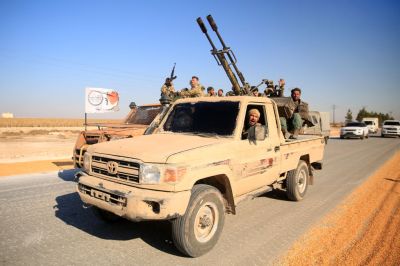
Please note that we at The Dispatch hold ourselves, our work, and our commenters to a higher standard than other places on the internet. We welcome comments that foster genuine debate or discussion—including comments critical of us or our work—but responses that include ad hominem attacks on fellow Dispatch members or are intended to stoke fear and anger may be moderated.
With your membership, you only have the ability to comment on The Morning Dispatch articles. Consider upgrading to join the conversation everywhere.